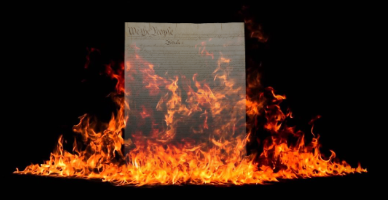
“The peace, the prosperity, and the very existence of the Union are vested in the hands of the justices of the Supreme Court.” -Alexis de Tocqueville
Which was probably a mistake, but an understandable one.
When the Constitution was written, and until quite recently, elections were very difficult to hold and needed to be minimized because of that.
It could take months to collect and count the votes for the entire country.
So it made sense, if only technologically, that the Constitution doesn’t have any way for the voters to override a corrupt Supreme Court.
Now we could do it in an afternoon, on a relatively inexpensive computer.
Of course, the men who wrote the Constitution were not big fans of democracy and were heavily invested in the idea that educated men of leisure were more capable than the masses of getting it right; the idea that the filthy majority should be able to negate a corrupt Supreme Court decision would have been alien to them.
The idea that there could be a corrupt Supreme Court was mostly alien to them.
And thus, here we are.
We’re stuck in a system where:
- the Executive is acting far outside its powers and the law
- the legislature is largely supportive of (or silent on) those actions
- the Judiciary is corruptly creating new powers and immunities to enable this lawless Executive
- the only intervention the system allows to the voters is to wait till the next scheduled election
This is not a good situation for a country to be in.
And will probably not end well at all.
So, what could have been done to prevent this situation reaching the extreme that it has?
- federal initiative and recall elections for judges
- federal term limits for judges
- a method for voters to overrule the Supreme Court
- as a last-resort: a pre-set process for succession by a state
None of this would guarantee the country couldn’t screw itself to a wall like this, but at least it’d be harder to do.
- Enabling Fascism: The Supreme Court Targets Judicial Review
- The Old Dog Needs Some New Tricks: Learning From The Laboratories Of Democracy
- High Crimes And Misdemeanors: Everything He Does Is Illegal, So Is He Really President?
- Dueling Sovereigns: The Feds Are Arresting State Judges
- Spreading It Around: One Person, One Job
